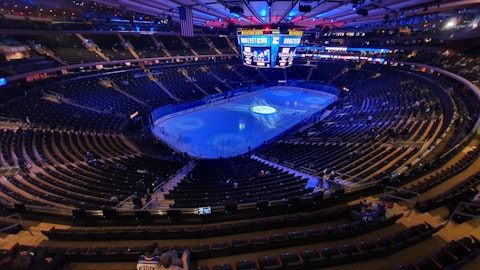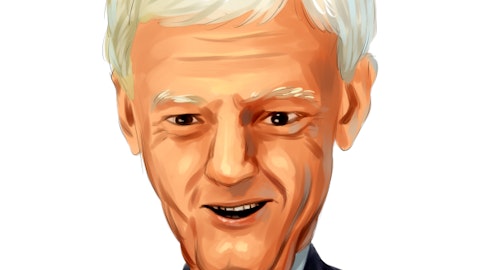Brandon Ross: Excellent. Thank you so much.
Operator: Your next question comes from the line of Logan Angress from Wolfe Research. Your line is open.
Logan Angress: Thanks for taking the question. I guess, first, on demand, you mentioned per caps and per game revenues a little bit. I’m curious to what extent are you seeing the Knicks and Rangers benefit from strong demand for live entertainment more broadly. And I guess, if you could dig in a little bit more into specific per caps or specific kind of revenue sources that are seeing sort of the biggest tailwinds? And then in terms of costs, can you provide any more color on the cost forecast for this year? And do you expect the revenue growth you mentioned to outpace growth in costs? Thank you.
David Hopkinson: Thanks, Logan. I will start and dig in, as you said, on the specifics for the demand and how that’s translating into our business. As we said in the opening remarks, we are up across almost every line on a per game basis but with some granularity here. Ticketing, our average season ticket renewal rate was over 94%. And again, that was on a larger renewable base and with season ticket price increases for both teams. So that’s a huge lever for us. And as a result, we are seeing growth in overall per game revenue, ticket attendance and total ticket yield so far the seasons — this season, pardon me. If I think about suites, we are seeing record revenues from suites driven by both strong new sales and robust renewal activity.
And then we are also benefiting from the addition of those two new event level suites at the Garden. On sponsorship, we’ve welcomed a number of new partners this year, joining our strong roster of signature partners. And looking to — we’ve also got headroom here. We look — continue to pursue valuable growth opportunities, the jersey patch for the Rangers, international sponsorship for the Knicks. We are focused on maximizing the value of these opportunities and that’s one of the reasons that we’ve entered our new relationship with Oak View Group and Crown Properties Collection who we believe will help us expand this area of the business over the long-term. We are also really focused on fan engagement and driving deeper relationships with fans results in enhanced performance across every aspect of our business.
So it seems like that third jersey for the Rangers, the special edition jersey that we are going to wear next week at the outdoor game at the NHL Stadium series, our Siegelman Stable collection with the Knicks, the partnership we did — or the merchandise partnership we did with KISS [ph], these are all things that excite and engage our fans. And one of the reasons that we are experiencing food and beverage and merchandise per capita spending, which is up almost 10% over the same period last year. So we are really bullish on our business for the remainder of this fiscal and beyond. Victoria, do you want to take the second half of that question?
Victoria Mink: Sure. Good morning, Logan. Let me talk a little bit about revenue and expenses in this fiscal year. So taking a step back, right, we do expect to again deliver robust revenue growth on a year-over-year basis, excluding the impact of the playoffs. And as you could see in our second quarter results today, we saw higher average per game revenues across tickets, suites, food and beverage and merchandise. So we are seeing overall positive momentum across our business and expect that to continue for the remainder of the fiscal year. Now while we are not providing more specific AOI guidance, as I mentioned earlier, AOI this fiscal year will reflect the growth in these revenues. But in addition, there will be the impact of higher team operation expenses and league-related costs.
So what that really includes is, #1, the impact of our current rosters. So as a reminder, the NHL salary cap saw a modest increase from $82.5 million to $83.5 million. Now while on the NBA side, the salary cap has increased over $12 million to $136 million this season. So in addition to those costs, we are also expecting higher revenue sharing expense and lower projected luxury tax receipts. But with that, based on the momentum we’ve seen, we remain confident in the trajectory of our business this fiscal year.
David Hopkinson: Thanks, Logan.
Operator: Your next question comes from the line of Paul Golding from Macquarie Capital. Your line is open.
Paul Golding: Thanks so much. Just had a quick question on the ticket sales commentary. You mentioned that combining group and individual, average ticket yields were up in fiscal 2Q year-on-year. I was wondering if you could break that down a bit more for us, just in terms of how group is faring relative to individual in making up that yield comment? And then secondly, just around sponsorship demand, a similar question for year-to-date or balance of the year. Any commentary on the mix? In other words, where you’re seeing the strength come through, whether it’s signage, ads or otherwise? Thank you.
David Hopkinson: Sure. Thanks, Paul. I’ll talk about the tickets first. As I mentioned, our average combined renewal rate for season ticket packages this season was over 94%. And again, I think that’s really noteworthy considering we had both the large — pardon me, the larger renewal base and season ticket price increases for both teams. And we were strong last year where we renewed over 90%, but the 94% is — we are really pleased bet [ph]. So with the larger season ticket base comes a reduced amount of individual tickets available for sale but we are seeing both individual and group ticket sales also continue to be really strong. Average paid attendance for groups is up year-over-year. And overall, including the season tickets, average per game paid attendance is up as well.





